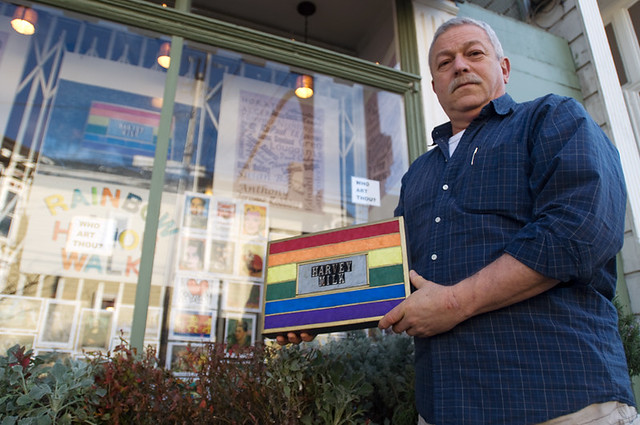
People touring the Castro district will soon have more than its iconic flag to photograph as the development of the San Francisco Rainbow Honor Walk – a proposed collection of influential lesbian, gay, bisexual and transgender people displayed in plaques similar to the stars on Hollywood’s Walk of Fame – is placed on city streets.
The first 20 LGBT figures were selected by the Rainbow Honor Walk Steering Committee – a group of Castro volunteer residents and business owners – following a set of criteria, according to Isak Lindenauer, co-chair of the project and the 32-year owner of an antiques shop in the neighborhood.
“The Rainbow Honor Walk will show young LGBT people they are not alone and that they come from a community with a rich history and potential,” he said. “(The project) will also show people we’re a community that is all colors, social classes and both sexes.”
Kathrine Holland, treasurer of the committee and a merchant in the Castro, said the project is a way to bring more people into a neighborhood that will continue to entertain but will also educate.
According to Lindenauer, the 20 honorees, self-identified as LGBT, made a significant contribution in their field and are no longer alive.
Jane Addams, the first American woman to win the Nobel Peace Prize, Yukio Mishima, a Japanese film director, and Oscar Wilde, an Irish playwright, are among the first names that will appear on 19th street between Diamond and Castro streets.
Lindenauer said only the first 20 names had to meet the criteria. Eventually, the honor walk will recognize local LGBT activists, poets and straight men and women who have spoken out on behalf of the community, he said.
“The first thing that comes to my mind since everyone will be walking on the street is that each plaque represents a stepping stone toward acknowledging LGBT people,” said Andrea Hamel, a 21-year-old student studying child and adolescent development at SF State.
Hamel, a member of Queer Alliance, a student organization on campus that promotes awareness and resources to LGBT students, wants the Rainbow Honor Walk to spark continued progress.
“Hopefully the project motivates the entire community to continue moving forward,” Hamel said.
David Perry, co-chair of the project, said the Rainbow Honor Walk will be completely dependent on private funding. People can make tax-deductible donations online and in person at Isak Lindenauer’s Antiques on 19th Street.
Before any construction is done, the plaques will need to go through the design review process because the project will be on city land, according to Vicky Knoop, program manager of the Civic Design Review.
“We’re working as fast as we can to get the first plaque installed,” Perry said, who proposed a similar project in 1994 and was approved by the board of supervisors, but failed to move forward due to different issues affecting the LGBT community.
Ideally, Perry said the first plaque could be on the streets by June, which has been recognized since 2000 as Gay Pride Month, or by National Coming Out Day on Oct. 11.




